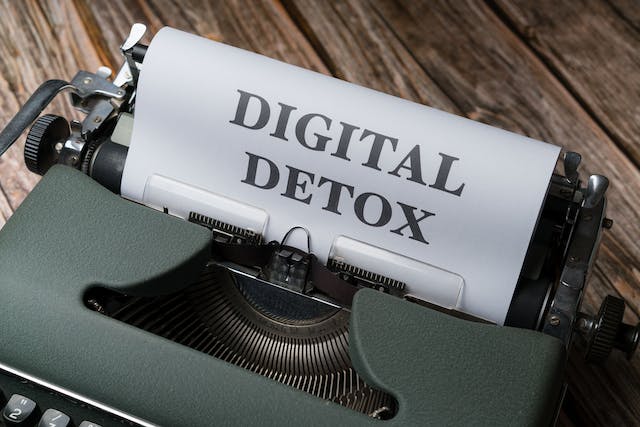Do you ever feel like your phone has become a part of your hand? Too much digital addiction can cause a host of problems in different aspects of your life. In this blog, you will learn about the importance of digital detox and 10 reasons why you should do it once in a while.
According to research, users between the ages of 16 and 64 spend about 7 hours a day in front of screens. There’s no denying you spend more time on screens than you invest in important activities like eating, working out, or talking face-to-face with your loved ones.
It’s high time to ask yourselves: Is your digital addition costing you happiness and well-being? It is, for sure.
I bet you can’t disagree. But what if I told you that you can break this habit to reclaim your happiness, health, and productivity?
All this is possible through digital detox.
We live in a time where digital disconnection seems like a thing of the past. Every day, we stare at our screens longer than we would want to admit. But before you decide how digital detox will help you, let’s hit the pause button and discuss digital detox, and the 10 reasons why you should give it a thought.
10 Important Reasons You Need a Digital Detox ASAP
You may find yourself flooded with a lot of information that digital noise may be getting to you. The numbers don’t lie either.
A study found that an average American checks their phone 96 times a day (that’s once every 10 minutes). Isn’t it surprising?
This digital addiction was getting so overwhelming for me until I realized, how unpleasant and harmful it is to continue it.
It’s wonderful how technology has changed your lives by connecting you to people and information worldwide. But, this also has a drawback.
The more you cherish the digital world, the more you are losing contact with the real world. You lose touch with yourself and the small things in life that you once enjoyed.
What is Digital Detox?
A digital detox refers to a time when you choose to not use any digital devices. This includes TVs, computers, smartphones, tablets, and any other digital gadgets.
The idea is to free yourself from any distractions so that you can connect with your real life.
You can use this time doing things that you love. You can read books, spend time in nature, exercise, meditate, or talk to people in person.
5 Signs That You Might Need a Digital Detox
Sometimes you get so absorbed in your screens that it starts to affect your well-being. So, here are 5 signs that show that you might need a digital detox:
1. You’re constantly distracted: You use digital devices to do many things. This makes it difficult for you to stay focused on your work or conversations.
2. You have sleep issues: You spoil your sleep time for screen time. This results in poor sleep quality and sometimes insomnia.
3. You’re neglecting your real-life relationships: You’re ruining your real-life relationships due to your relationship with digital devices. This leaves you unavailable for your family and friends who need your time or presence for real.
4. You’re stressed or anxious: Consuming negative online news and social media dramas on a regular basis can often make you feel stressed or anxious.
5. You ditched your hobbies and interests: Your virtual world has taken over your hobbies or interests.
10 Reasons You Should Go for Digital Detox
A little disconnection from the digital world can lead to a more connected life in reality. Hence, here are the 10 reasons that I found beneficial for taking a break from the digital world:
1. Keeps your mind healthy
Do you ever feel like your mind is racing all the time?
I get the same feeling when I use my phone in excess. Then, I realized that my brain needs to disconnect from this never-ending flood of information from my devices.
A study says constant screen time might cause stress, anxiety, and depression. So, this was a wake-up call for me.
Nowadays, I put my phone aside for a few hours every day when I’m not working on something that includes my phone.
The result? The more I work at it, the less the urge to check my phone.
Try it yourself.. Your mind will thank you for this, I promise.
2. Improves your physical health
Prolonged screen time isn’t good for your body. It can result in issues like bad posture, back pain, and guess what else? It can damage our eyes.
An average person blinks 15 to 20 times a minute. But when they are staring at screens, it drops to around 5 times per minute.
So, I made a little change in the way I work. I take regular breaks while I work on my laptop. I take a quick stroll from one room to another or do some stretches.
This not only makes me feel better, but I also have more energy now.
3. Increases your productivity
Who doesn’t want to get things done faster? But those endless distractions due to notifications from your devices make things difficult.
I had also been experiencing it. I would start to work, but every time a notification popped up, I would go down the social media rabbit hole. This ruins both my workflow and my productivity.
The truth is that the distractions from your phones cause most of you to waste time. Can you think of the productive things you might do during that time?
To deal with this, I now have set specific times to check my notifications or social media. This helps to get more work done in less time and feel more satisfied.
Give it a shot yourself to feel a sense of accomplishment.
4. Promotes your sleep quality
Had trouble falling asleep at night? Count me in! I used to toss and turn for hours before I fell asleep because I used to scroll through my phone till late at night.
Studies show that the light from your screens messes with your body’s production of melatonin, the sleep hormone.
It takes longer to fall asleep when you use your phone right before bed. It affects the quality of your sleep, which in turn has adverse effects on your health.
Thus, I stopped using my phone at least an hour before bedtime and saw a change in my sleep pattern. Now, I fall asleep as soon as I hit the bed and wake up feeling more refreshed.
Though it took some time to put it into practice, it was all worth it. If you still struggle with your sleep schedule, try reading an hour before bed. It will help you sleep faster. It has definitely helped me.
5. Revive your relationships
These days, it’s normal to see family gatherings where people are busy with their phones rather than interacting with each other. It seems our phones have become more interesting than the people right in front of us.
However, this behavior is destroying your interpersonal relationships.
Hence, I now make it a point to stop myself and others from using their phones when we are together. We then enjoy each other’s company having meaningful conversations.
You will see how close you get to your loved ones just by disconnecting from your devices for a while.
6. Boosts your creativity
Have you ever had a brilliant idea strike you at the most unexpected time? Yes, I get some of my finest ideas when I take time off from screens. It can be anytime while having my food, taking a shower, or watching people right from the top of my terrace.
This got me thinking: Is spending time on screens all day blocking my creativity? Well, I’m not alone in thinking this way. Many artists, authors, and intellectuals take breaks from screens to let their imaginations run free.
Yes, it feels like giving your brain a breath of fresh air. You can take your digital break with meditation, body scanning, going for a long walk, or just staring at the sky.
7. Saves your time and money
Have you ever observed how time flies when you’re so much into your virtual world? I know I was. And you know what? A lot of money slips through your fingers as a result of impulsive online shopping.
I used to lose hours browsing through online stores and buying stuff on the spur of the moment. I realized I could have invested that precious time and money in more meaningful experiences.
I’m more conscious of my time and online spending habits now. I have learned to shop mindfully and not overspend.
This helps you to regain control of your finances and time by practicing a consistent digital detox.
8. Improves your communication skills
Your online interactions sometimes lack the details that come with face-to-face communication. Using digital devices regularly makes it harder for you to express yourself and understand others effectively.
But, you can improve your communication skills by going on a digital detox.
During the detox, I try to speak with people in person and practice active communication. This has improved my ability to express my ideas and feelings and empathize more with others.
Good communication skills are a must in both personal and professional environments. They can open so many new doors to your career growth.
9. Helps you rediscover your hobbies
Almost everyone has hobbies, be it cooking, gardening, painting, or playing an instrument. But your hobbies take a back seat when you get more involved in your screen-obsessed world.
Digital detox makes it possible for you to rediscover and nurture these beautiful things.
During my detox period, I fell back in love with the hobbies I left behind long ago. I had fun picking up my brush and painting my favorite Madhubani art.
Cooking became a creative outlet, and gardening offered a connection to nature and relaxation. These things not only brought me happiness but also added depth and richness to my life.
You can always reconnect with yourself and your hobbies and discover new ones during digital detox.
10. Increases your sense of gratitude
Nowadays, it’s easy to take the simplest joys of life for granted. A digital detox can help you remind yourself of the things you often overlook and develop a sense of gratitude.
During my detox, I try to do simple things – like a warm cup of tea, a beautiful sunset, or a heartfelt conversation with a friend. These experiences allow me to acknowledge and appreciate the little things.
Practicing gratitude is now a daily ritual for me as I document all the things I’m thankful for in my journal.
How Much Time Does a Digital Detox Take?
Digital detox is a personal process. Hence, the timeline is quite subjective. It depends on you and your goals. You can take a few hours or a day off if that’s all you want.
But if you’re very much addicted to your devices and wish to break this habit, it might take a few weeks or even more.
The duration also depends upon how much you feel the need for your devices. If you feel anxious when you’re away from your phone, it could take longer to feel better.
Also, it becomes difficult to follow the detox if you have to use a laptop for work or if your parents need to call you.
However, you can ask your friends or family to join you in your detox. Things will get easier for you this way.
Personally, I prefer taking short breaks every now and then.
However, there’s no one-size-fits-all. If you start with a short detox and like it, you can always continue to do longer ones.
What are the Stages of the Digital Detox?
The stages of a digital detox can differ depending on your goals and preferences. But, here’s a broad overview of the common stages:
1. Becoming Aware: This is the first and extremely important stage. It involves the realization that your screen habits have become out of control and now you need a change.
2. Setting Goals: Once you’re aware of the problem, then you set your detoxification goals. This could include cutting back on screen time, limiting specific websites and apps, or simply making more mindful use of the technologies.
3. Creating a Plan: Here, you create a plan and then decide on the duration of the detox. Ensure that you make a list of rules or guidelines, such as what devices or apps you will avoid and when.
4. Informing Others: Tell your friends and family about your plans. This helps you to manage expectations and let people know why you might not be available at that certain time.
5. Decluttering Digital Life: It’s a good idea to declutter your digital life before you formally start your detox. This includes organizing files, clearing your email inbox, and removing unnecessary apps or accounts.
6. Unplugging from Screens: This stage involves spending less time in front of a screen. You will focus on offline activities, such as reading books, spending time in nature, engaging in hobbies, or simply experiencing your real life.
7. Reflecting upon Your Progress: Analyze your progress while going through the detox. Keep track of any changes in your mood and productivity. This can help you understand the impact of your digital habits on your well-being.
Your detox period is over now. You can reintroduce your digital devices and mindfully resume online activities now. This time, think about which aspects of your old habits you wish to remove and what you would like to change moving ahead.
How to Do A Digital Detox?
It’s easy to start a digital detox if you’re aware that you need one. The most important thing to keep in mind is to not sacrifice your quality of life for the detox. You can still use certain forms of technology that you need for your work or education.
If you’re ready to start your detox, here are 8 tips to help you do it properly:
- Plan Alternative Activities: Make plans for activities that bring out your creativity or artistic abilities. Spend time with your loved ones to avoid feeling bored or tempted to return to your devices.
- Disable Notifications: Turn off non-essential notifications on your devices to reduce the urge to check them often. Only allow important notifications, like calls and messages from your family or coworkers.
- Mark Device-Free Zones: Mark areas of your home where digital devices aren’t allowed. This can be the dining room or the bedroom (to promote healthier relationships and quality sleep).
- Schedule Screen-Free Time: Set aside certain times each day to stay completely offline. This can include an hour before bedtime to improve sleep quality.
- Use a Real Alarm Clock: Get a traditional alarm clock for setting alarms. This will help you start your day without swiping the screen to stop the alarm ringing on your phone.
- Find Offline Hobbies: Take up hobbies that don’t need digital devices. This can be anything from painting or singing to dancing or drawing. Do anything you love.
- Stay Active: Staying active can help reduce your dependency on screens. Consider going for a walk, practicing yoga, or hitting the gym.
- Ask for Help: If you find it hard to stick to your detox, ask a friend or family member who can hold you accountable and do it with you (if preferred).
Conclusion
So there you have it: 10 reasons why you should disconnect from your screens to reconnect with real life through digital detox. Remember you aren’t retiring from the digital world. You’re just taking a break.
It’s time to take a step back, get some fresh air, and enjoy the bliss of a tech-free day. Spend quality time with your loved ones, and rediscover your passions.
In a world full of screens, a digital detox might be just what you need to find your true self. So, GO AHEAD! TRY IT! Who knows, you might discover a whole new world of happiness and fulfillment.




